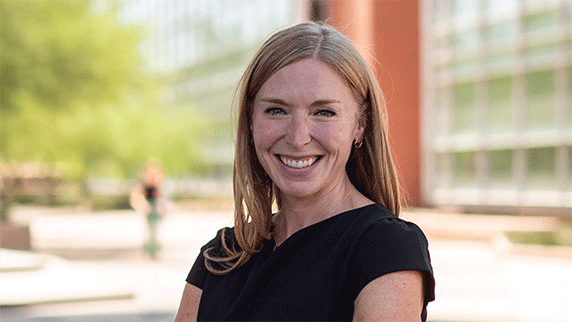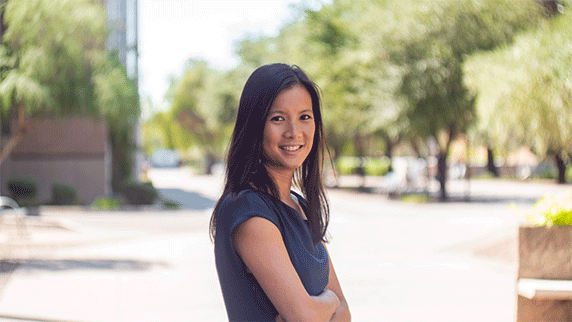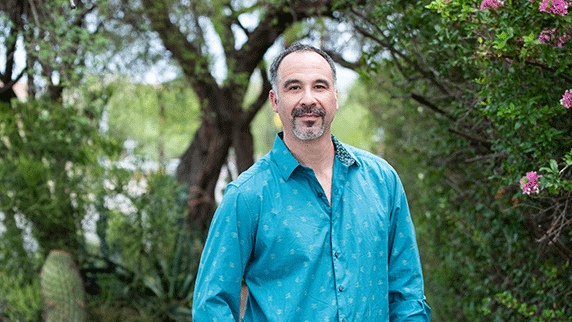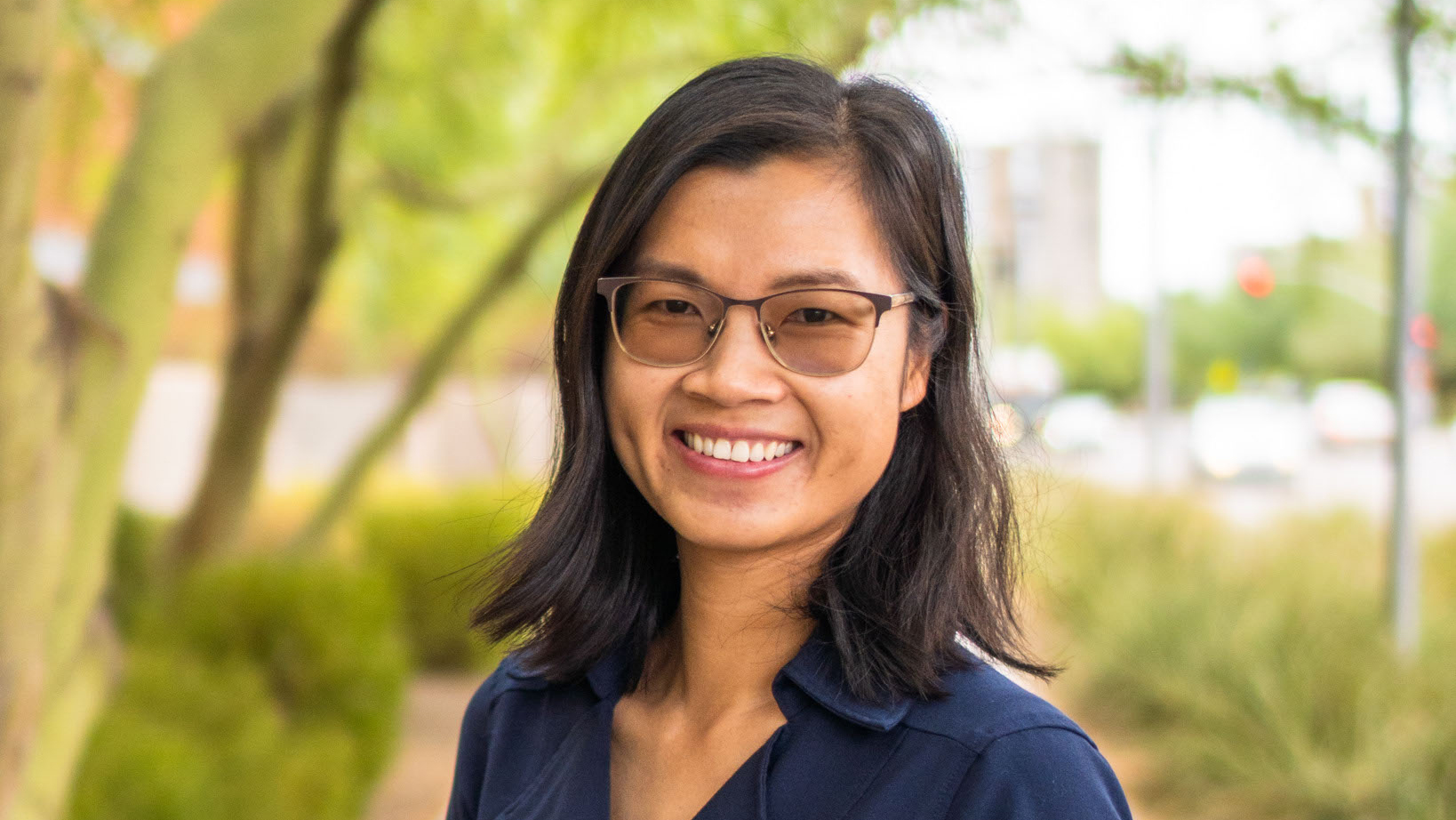
Clinical psychology
Psychology PhD specialization
Train as a clinical scientist in ASU's highly ranked, APA-accredited PhD program in psychology with a specialization in clinical psychology.
Specialization description
Degree awarded: Psychology, PhD
Clinical psychology is one of six degree specializations offered through ASU’s PhD program in psychology. Fully accredited by the American Psychological Association (APA) and the Psychological Clinical Science Accreditation System (PCSAS), and a member of the Academy of Psychological Clinical Science, the program follows the clinical science training model — emphasizing research-intensive preparation alongside comprehensive clinical training.
Designed for students entering with a bachelor's degree, the program can be completed in six years, including a one-year, full-time internship. Students begin practicum in their second year and work closely with faculty across core and affiliated labs on research related to mental and behavioral health, including:
- Substance use and addiction
- Psychological assessment and intervention
- Evidence-based treatment and clinical training
- Child and adolescent development and behavior
- Community-based prevention and public mental health
- Health psychology and chronic illness
- Trauma, adversity and resilience in at-risk populations
- Cultural and contextual influences on mental health
- Translational research and program dissemination
The Department of Psychology fosters a collaborative learning environment. Students complete a specialized core curriculum and engage in interdisciplinary research with faculty and peers across all areas of psychology. Graduates are well prepared for careers in academia, healthcare and public service.

Important dates
- September 1: Fall 2026 application opens.
- November 17: Fall 2026 application deadline.
Students must submit ASU’s graduate application and the Department of Psychology’s Slideroom application to be considered for admission.
Faculty and research labs
Join expert-led research labs exploring mental health, assessment, intervention and prevention through the lens of clinical science.
Core faculty

Dr. Rebecca Blais
MiSSiLe: Military Social Science
Lab
The MiSSiLE Lab investigates trauma and suicide risk among military service members and veterans. Research explores the impact of military sexual trauma, combat exposure, and PTSD on sexual health, relationship satisfaction and psychological well-being.

Dr. William Corbin
BARCA: Behavioral Alcohol
Research and Clinical
Advancement
The Behavioral Alcohol Research for Clinical Advancement (BARCA) Lab studies the psychological and behavioral processes behind alcohol use and related problems. Research includes lab-based simulations in a campus bar setting and longitudinal surveys, all aimed at improving prevention and treatment of alcohol use disorders.

Dr. Rick Cruz
CACTUS Lab: Youth Development,
Context and Prevention
The CACTUS Lab studies how cultural and contextual factors — like family and neighborhood environments — influence youth mental health and substance use. Research emphasizes self-regulation, prevention and intervention in Latinx and other minoritized populations.

Dr. Mary Davis
Emotion Regulation and Health Lab
The Emotion Regulation and Health Lab explores how emotional and social processes affect adaptation to chronic stress, including chronic pain. Projects examine mindfulness, childhood adversity, affectionate touch and other resilience factors that shape physical and psychological health.

Dr. Lauren Friedman
HEAT: Hyperactivity, Executive
Function and Attention
Treatment Lab
The HEAT Lab explores the cognitive mechanisms underlying childhood ADHD to improve behavioral treatments. Research uses experimental and meta-analytic methods to inform novel, evidence-based interventions for youth with attention and regulatory challenges.

Dr. Abigail Gewirtz
ADAPT Lab
The Adapt Lab develops, tests and implements preventive parenting interventions for families exposed to trauma, war and displacement. Research focuses on strengthening family resilience across diverse populations, including military families and those affected by forced migration.

Dr. Nancy Gonzales
CHIRP: Culture, Health, and
Implementation Research
in Prevention
The Culture, Health, and Implementation Research in Prevention Lab examines how cultural identity, family dynamics and neighborhood context influence adolescent mental health. Research informs the development of culturally grounded prevention programs, particularly for Mexican American and African American youth.

Dr. Joanna Kim
Engaging Families Lab
The Engaging Families Lab focuses on reducing disparities in behavioral health services among low-income, immigrant and ethnoracial minority youth. Research explores implementation strategies to increase family engagement and enhance the long-term impact of community-based interventions.

Dr. Linda Lueken
Health and Coping Lab
The Health and Coping Lab studies how developmental, cultural and cognitive influences impact stress responses and long-term health. Current research focuses on women’s health, infant development in low-resource settings, and the biological effects of childhood adversity.

Dr. Madeline Meier
Substance Use, Health and
Behavior Lab
The Substance Use, Health and Behavior Lab investigates the causes, patterns and consequences of substance use. Current studies focus on marijuana and vaping, and their links to cognition, vascular health and daily functioning in both young adults and older populations.

Dr. Nichea Spillane
PATHS: Positive Approaches to
Health Disparities and Substance
Use Lab
The PATHS Lab examines behavioral health disparities in North American Indigenous communities, including American Indian and First Nations populations. Grounded in positive psychology and behavioral choice theory, research focuses on risk, resilience and culturally informed intervention development.

Dr. Jack Waddell
DRAMA: Dynamic Research on Addiction and Momentary Assessment Lab
The DRAMA Lab studies short- and long-term risks associated with alcohol and cannabis use. Projects use ecological momentary assessment and longitudinal methods to examine daily patterns of use, developmental and acute risk factors and outcomes tied to co-use. The goal is to improve understanding of when, how and why substance use behaviors emerge and escalate.
Affiliated faculty

Dr. Leah Doane
Adolescent Stress and Emotion Lab
The Adolescent Stress and Emotion Lab studies how daily experiences affect physical and mental health. Using developmental psychology and biopsychosocial frameworks, they collect self-reports and measures hormones and sleep quality in real-life settings through ecological momentary assessment.

Dr. Thao Ha
@HEART: Healthy Experiences Across Relationships and Transitions Lab
Experiencing romantic relationships and feeling love for the first time is a profound experience for adolescents. The @HEART Lab investigates how adolescents learn to navigate romantic relationships and how these early relationship experiences contribute to their future wellbeing and relationships. They focus on technology’s transformative role (the good and bad) in romantic relationships, such as digital communication, social media, virtual and augmented reality, and artificial intelligence (AI).

Dr. Kathryn Lemery-Chalfant
Child Emotion Center
The Child Emotion Center studies how early biological and environmental factors influence children's mental and physical health. Using twin studies and measures like genetics, physiology and behavior, they investigate person-environment transactions across development to identify pathways to resilience and inform prevention programs.

Dr. Armando Piña
Courage Lab
The Courage Lab studies the development of anxiety in children and adolescents, using basic science approaches and creating interventions to test theoretical mechanisms of change. They aim to understand how courage, fear, and anxiety shape young lives, enhancing youth and family wellbeing through rigorous, practical research.

Dr. Jinni Su
Genes, Environment, and Youth
Development Lab
The Genes, Environment, and Youth Development Lab studies how genetic and environmental factors influence substance use and related behavioral and emotional health outcomes in adolescents and young adults from diverse racial and ethnic backgrounds.
Clinical directors

Dr. John Barton
As director of the Clinical Psychology Center, Dr. John Barton oversees the clinical training of student therapists and coordinates community field placements. A board-certified clinical child and adolescent psychologist, he specializes in the assessment and treatment of ADHD, learning disorders and pediatric health conditions. He also teaches courses in psychological assessment, brief therapy and practicum, and serves on core training teams in child and health psychology.
View faculty profile

Dr. Matthew Meier
Dr. Matt Meier is co-director of clinical training for the Clinical Psychology PhD program and a licensed psychologist specializing in substance use and integrated care. At ASU’s Clinical Psychology Center, he provides supervision in addiction-focused treatment and telehealth services. He leads federally funded initiatives to expand access to behavioral health care in rural and Indigenous communities and helps train future psychologists in evidence-based approaches to addiction.
View faculty profile
Research faculty
Dr. Laurie Chassin
Pathways of Risk and
Resilience Lab
Regents Emeritus Professor Laurie Chassin’s research examines how substance use and related risks develop and persist across generations. Her lab conducts large-scale longitudinal studies focused on alcohol, tobacco and other drug use, with an emphasis on adolescents and high-risk family contexts.
Although the Pathways of Risk and Resilience Lab no longer accepts graduate students, they may still find collaborative opportunities on ongoing studies or related research initiatives.
View faculty profile
Dr. Sharlene Wolchik
Prevention Programs
for At-risk Youth
Emeritus Professor Sharlene Wolchik designs and evaluates preventive interventions for youth facing major family stressors. Her work focuses on promoting resilience in children of divorce or parental loss, with long-term studies showing lasting mental and physical health benefits from evidence-based programs.
While the Prevention Programs for At-risk Youths Lab is not currently accepting graduate students, there may be opportunities for collaboration on ongoing projects.
View faculty profile
Courses and electives
Core courses. Courses that build the scientific and technical foundation of clinical psychology. Includes clinical practicum experiences and core training in research methods, ethics and evidence-based practices.
Electives. Courses and seminars tailored to students’ research interests and career goals. May include advanced practica, specialty topics or courses supporting an optional area of emphasis.
Substantive curriculum. Two required Advanced Training Modules (ATM) courses integrating science and practice in clinical or community modalities, taught by faculty with expertise in applied clinical science.
Accreditation requirements. Students complete coursework in biological, cognitive, affective, developmental and social bases of behavior to meet APA and PCSAS accreditation standards.
Research activities. Independent research and milestone projects completed under faculty mentorship. Students design and carry out an empirical investigation and may earn a master’s degree en route to the PhD.
Dissertation. Supervised research including proposal development, data collection and analysis, and the writing and defense of a final scholarly work.
Graduate students in the clinical psychology training area complete 84 credit hours shaped by APA accreditation standards, personal goals and faculty mentorship. The curriculum includes 27 core credits in clinical psychology, breadth courses across five behavioral domains and two advanced training modules linking research and practice. Students may choose electives aligned with optional emphasis areas in child clinical psychology, health psychology or community and prevention. Most complete the program in six years, including a one-year internship.
Optional areas of focus
Child clinical psychology
This emphasis offers training in the causes, assessment, treatment and prevention of childhood mental health conditions. Students often engage in research and clinical work focused on children and families under stress, including bereavement and divorce. Many faculty also collaborate in community-based prevention efforts. A developmental perspective is emphasized throughout.
Health psychology
Students focusing in health psychology study the interface of mental and physical health, exploring how psychological principles help address the challenges of modern medicine. Research topics include chronic illness, pain, patient adherence, stress and immunity, and psychosocial risk and protective factors. Many students apply this work through community partnerships and medical settings.
Community and prevention
This emphasis centers on understanding and preventing mental health and substance use problems through a community lens. Students study how family, stress, culture and neighborhood factors affect well-being, while gaining experience designing, implementing and evaluating interventions. Projects often focus on high-risk youth populations and school- or community-based programs.
What career is calling you?
Graduates of ASU’s clinical psychology PhD program pursue careers in academic research, healthcare, and public service. Alumni go on to faculty roles at universities, clinical positions in medical schools, VA hospitals, and health systems, and practice in community mental health centers or private settings. Others contribute to government agencies, including those focused on public health and defense.

This specialization trains scientists to improve mental health through research and evidence-based care. Only 3 to 10 students are admitted yearly from 200–300 applicants.
Get in touch
Dr. Madeline Meier | Clinical Psychology Area Head and Co-Director of Clinical Training
[email protected]
Dr. Matthew Meier | Co-Director of Clinical Training
[email protected]
Ava Zarandy | Clinical Area Student Support Coordinator
[email protected]